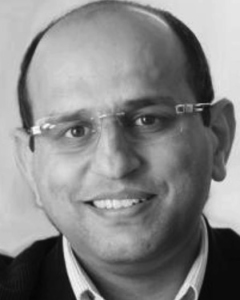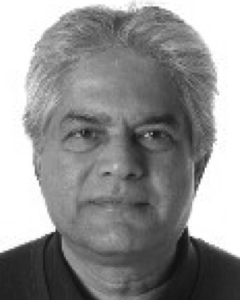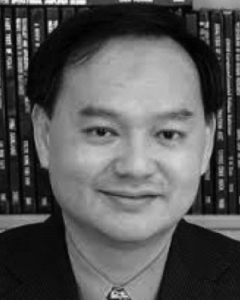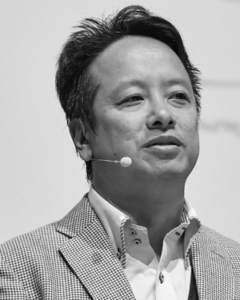Webinar Series March 26, 2020

26 March 2020, 11 AM – 12 PM ET
View Event Recording | View Special Issue
Speakers
Description
This webinar will provide an overview of various sub-topics of electronic skin discussed in the October 2019 Proceedings special issue, “Flexible Electronic Skin: From Humanoids to Humans.” University of Glasgow’s Professor Ravinder Dahiya will open the webinar with an overview of electronics skin in robotics and as the “second skin” in wearable and health monitoring applications. University of Cambridge’s Professor Arokia Nathan will then discuss the flexible Ultralow Power Sensor Interfaces for eSkin. This will be followed by Nanyang Technological University’s Professor Joseph Chang, who will present the co-design between the different chains of flexible electronics supply chain to derive practical flexible electronics and sensors for applications where the substrate is expected to bend. The last discussion will Technical University of Munich’s Professor Gordon Cheng’s discussion about the holistic engineering approach for artificial skin for robots and an example of a multi-modal skin cell showing multiple humanlike sensing modalities. The presentations will be followed by Q&A with the panelists.
About the Presenters
Ravinder Dahiya (Senior Member, IEEE) is currently a Professor of electronics and nanoengineering with the University of Glasgow, Glasgow, U.K., where he is also the Leader of Bendable Electronics and Sensing Technologies (BEST) Research Group, James Watt School of Engineering, which conducts fundamental and applied research in flexible and printable electronics, tactile sensing, electronic skin, robotics, and wearable systems. He has led several international projects on e-skin, robotic skin, and flexible electronics. He has authored more than 250 research articles, four books/monographs, and several book chapters. He holds 12 patents (including seven submitted). Prof. Dahiya received the Prestigious EPSRC Fellowship, Marie Curie Fellowship, and Japanese Monbusho Fellowship. He was a recipient of several awards, including the 2016 Microelectronic Engineering Young Investigator Award and the 2016 Technical Achievement Award from the IEEE Sensors Council. He was the TPC Co-Chair of the IEEE Sensors Journal in 2017 and 2018 and the Founding Chair of the IEEE Flexible and Printable Sensors and Systems (FLEPS). He serves on the Editorial Boards of the Scientific Report and the IEEE Sensors Journal and is the President-Elect and a Distinguished Lecturer of the IEEE Sensors Council.
Arokia Nathan (Fellow, IEEE) received the Ph.D. degree in electrical engineering from the University of Alberta, Edmonton, AB, Canada. He held postdoctoral positions at LSI Logic Corp., USA, and ETH Zürich, Zürich, Switzerland. He joined the University of Waterloo, Waterloo, ON, Canada, where he held the DALSA/NSERC Industrial Research Chair in sensor technology and subsequently the Canada Research Chair in nanoscale flexible circuits. In 2006, he joined the London Centre for Nanotechnology, University College London, London, U.K., as a Sumitomo Chair of Nanotechnology, and subsequently held the Chair of Photonic Systems and Displays with the Department of Engineering, University of Cambridge, Cambridge, U.K., where he led a multidisciplinary research group working on the heterogeneous integration of materials and processes, sensors, energy harvesting, and storage devices pertinent to wearable technologies. He is currently the Chief Technical Officer of Cambridge Touch Technologies Ltd., Cambridge, a company spun out of the University developing advanced interactive technologies. He has held visiting professor appointments at the Physical Electronics Laboratory, ETH Zürich, and the Engineering Department, University of Cambridge. He has authored or coauthored more than 600 articles in the field of sensor technology, CAD, thin-film transistor electronics, and has coauthored four books. He holds more than 110 patents filed/awarded and has founded/co-founded four spin-off companies. Dr. Nathan is a Chartered Engineer (U.K.), a fellow of the Institution of Engineering and Technology (U.K.), and an IEEE/EDS Distinguished Lecturer. He was a recipient of the 2001 NSERC E.W.R. Steacie Fellowship, the Royal Society Wolfson Research Merit Award, and, recently, the BOE Distinguished Contribution Award for TFT Compact Modeling and Circuit Design. He serves on technical committees and editorial boards in various capacities.
Joseph S. Chang (Senior Member, IEEE) received the B.Eng. degree in electrical and computer engineering from Monash University, Melbourne, VIC, Australia, in 1983, and the Ph.D. degree from the Department of Otolaryngology, Faculty of Medicine, University of Melbourne, Melbourne, in 1990. He was the Associate Dean of Research and Graduate Studies with the College of Engineering, Nanyang Technological University (NTU), Singapore, where he held several other senior academic/administrative positions, is currently a Professor and the Director of Virtus (IC Design Center of Excellence), and is a member of the NTU’s Research Council. He is an Adjunct Professor with Texas A&M University, College Station, TX, USA. He has founded four startups, has designed numerous related products adopted for industry and commercially, including obtaining sizable funding from venture capitalists and multimillion dollar industry research and industry contracts. He has received numerous academic, defense, and industrial grants exceeding $15 million, including from the Defense Advanced Research Projects Agency (USA), the European Union, multinational corporations, and from Singapore’s funding agencies. He has authored and coauthored over 200 science and engineering publications (including several ranked #1 in Goggle Scholar). He holds more than 30 awarded and pending patents, and has licensed numerous patents, knowhow, and technology to industry. His research is multidisciplinary. Dr. Chang was a recipient of numerous technical awards, including the 2018 IEEE Darlington Award, the IEEE Outstanding AE Award, the IEEE CAS Outstanding Prize (Live Demo), the Temasek Lab’s Best Publication Award, and several best paper awards at major conferences. He was the Chair of the Analog Signal Processing Technical Committee, the Life Sciences Systems and Applications Technical Committee, and the Biomedical and Life Science Circuits and Systems Technical Committee, all of the IEEE Circuits and Systems Society. He has chaired several international conferences, including the IEEE-National Institutes of Health (NIH) Life Sciences Systems and Applications Workshop, the IEEE-NIH CAS Medical and Environmental Workshops, and the International Symposium on Integrated Circuits and Systems. He was an IEEE Distinguished Lecturer from 2012 to 2013. He served as the Guest Editor for the Proceedings of the IEEE for two special issues and the Corresponding Guest Editor for the IEEE Journal of Emerging and Selected Topics and the IEEE Circuits and Systems Magazine. He was an Associate Editor of several IEEE publications, including the IEEE Transactions on Circuits and System–Part I: Regular Papers, the IEEE Transactions on Circuits and Systems–Part II: Express Briefs, and the IEEE Circuits and Systems Magazine, and was a Senior Editor of the IEEE Journal Emerging and Selected Topics, and the Editor of the Open Column of the IEEE Circuits and Systems Magazine. He recently founded the new Flexible Hybrid and Printed Electronics Special Interest Group (CASSFlexible). He was the keynote/plenary speaker at several major conferences, including the IEEE ICCAS’13, IBBN’14, IEEE Async’14, IEEE IECES’15, IEEE MidWest Symposium on Circuits and Systems’16, and at the IEEE NEWCAS‘18.
Gordon Cheng (Fellow, IEEE) received the bachelor’s and master’s degrees in computer science from the University of Wollongong, Wollongong, NSW, Australia, in 1991 and 1993, respectively, and the Ph.D. in systems engineering from the Department of Systems Engineering, Australian National University, Canberra, ACT, Australia, in 2001. He has extensive industrial experience in consultancy as well as contractual development of large software systems. He was also the Founder and CEO of the company GTI Computing, Sydney, NSW, Australia, from 1995 to 2006, which specialized in networking and transport management systems in Australia. He has been Chair of Cognitive Systems, Technical University of Munich, Munich, Germany, since 2010. He is currently the Founder and the Director of Institute for Cognitive Systems, Faculty of Electrical and Computer Engineering, Technical University of Munich. He has been the Coordinator of the Center of Competence Neuro-Engineering since 2013. He has also been the Director of the Elite Master of Science Program in Neuroengineering (MSNE) of the Elite Network of Bavaria since 2016. He is also the co-inventor of approximately 20 patents and the author of approximately 300 technical publications, proceedings, editorials, and book chapters. His current research interests include humanoid robotics, cognitive systems, artificial robot skin, brain–machine interfaces, bio-mimetic of human vision, computational neuroscience of vision, action understanding, human–robot interaction, active vision, and mobile robot navigation. Dr. Cheng was named IEEE Fellow 2017 for his contributions in humanoid robotic systems and neurorobotics.



